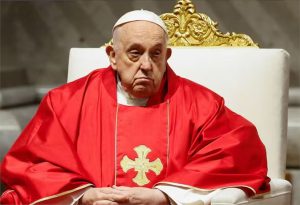
New Delhi. Pope Francis, the biggest religious leader of Christianity, has died at the age of 88. The Vatican confirmed his death. The Pope was ill for a long time. He had pneumonia in both lungs. Pope Francis died just a day after Easter Sunday. On Sunday, on the occasion of Easter, he also gave a surprise appearance among the people. After the death of the Pope, discussions are also rife about his successor. Let us know which names are at the forefront among the successors of the Pope.
1. Luis Antonio (Philippines)
Luis Antonio Tangal is currently at the forefront in the race for the new religious leader of Christians. Luis Antonio is 67 years old and is considered to be the strongest contender. He is one of Francis’s closest and most trusted people. He is considered experienced enough to take over the Pope’s throne.
2. Pietro Parolin (Italy)
70-year-old Pietro Parolin’s name is also included among the top officials of the Vatican. As the Vatican’s foreign minister since 2013, he has played a major role in diplomatic matters. This includes sensitive negotiations with the governments of China and the Middle East. Parolin can provide stability keeping in mind some of Francis’ special tasks. His strong grip on the Vatican bureaucracy makes him a strong candidate.
3. Peter Turkson (Ghana)
76-year-old Peter Turkson is a well-known name in the social justice circle of the church. He has raised his voice against many social issues, including issues like climate change, poverty and economic justice. If Turkson is elected as Pope, it will be a historic moment. The first African Pope was Gelasius, who was in the post of Pope from 492 to 496 AD. Born in Rome to African parents, Gelasius was known for his theological writings and his strong advocacy of charity and justice for the poor.
4. Peter Erdő (Hungary)
Peter Erdő, 72, is a leading conservative candidate. A respected canon law scholar, Erdő has been a strong supporter of traditional Catholic teachings and doctrines. He previously served as head of the Council of European Bishops’ Conferences and emphasized theological conservatism. For those who want a return to the conservatism of John Paul II and Benedict XVI, Erdő would be a major change from Francis’ approach.
5. Angelo Scola (Italy)
Cardinal Angelo Scola, 82, has long been a contender for the papacy. He was one of the favorites in the 2013 conclave that elected Pope Francis. Scola, the former archbishop of Milan, has deep theological roots and appeals to those who support a more centralized and hierarchical church.
When will the next pope be elected?
1. A papal conclave typically begins 15 to 20 days after a pope’s death. This time allows for funeral rites, a nine-day mourning period known as Novemdiales, and time for cardinals from around the world to travel to Vatican City.
2. Until a pope is selected behind the closed doors of the Sistine Chapel, the outcome will remain uncertain as ideological factions within the church consider their options between continuity and more conservative change.
3. The next pope will inherit a church at a crossroads, grappling with declining influence in Europe and North America, growth in the global south, and ongoing internal debates about its future.
How is the next Pope chosen?
1. The Pope is elected according to centuries-old Vatican traditions. The College of Cardinals under the age of 80 will vote in secret inside the Sistine Chapel. A two-thirds majority is required to elect a new Pope.
2. If no consensus is reached, additional rounds of voting will continue until a candidate with the required support emerges.
3. Apart from this, when consensus is not reached in one round of voting, the ballots are burned and the black smoke coming out of the chimney of the Sistine Chapel signals to the people present on television and in St. Peter’s Square that the conference is going on.
4. At the same time, when white smoke is seen, understand that a new Pope has been elected.
©2025 Agnibaan , All Rights Reserved